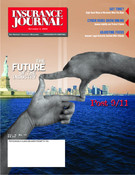The events of Sept. 11, 2002 are no doubt unique, but as with all disaster, there are some that are likely to take advantage of the situation. Needless to say, insurance fraud has reared its ugly head over the last year as claims have been filed in relation to 9/11.
Among those combating this problem has been the New York Department of Insurance.
New York Insurance Commissioner Gregory Serio said his department has actively coordinated with other law enforcement agencies to “make sure there was a good communication link between us to discover any fraud that would come up. There were some instances where you had some crossover between charity fraud and insurance fraud and that’s what made that link so valuable. We happily have had relatively few insurance fraud cases coming out of 9/11. Even one of them is heinous enough given the atrocities that occurred. We’ve had 58 fraud cases open for investigation to date 17 life, 15 workers’ comp, five auto cases and 21 miscellaneous. I think we were happy to see how low that number was.”
According to Serio, the cooperation among the various state insurance departments has also been critical to cutting down the number of fraud instances.
“There has been excellent cooperation among the states,” Serio remarked. “The most significant cases had to do with out-of-state life insurance scams that simply weren’t true.
And how has this experience helped the department’s efforts in fighting fraud?
“It has allowed us to bring our fraud operation to the mainstream,” Serio remarked. “I think this will be a template for cases in the future of integrating the fraud prevention component much more quickly into our response protocol. Since this is still an active crisis, I think there will be some opportunities seen by unscrupulous characters to try and take advantage and get fraud claims in.”
Mike Fella, director of Operations for the National Insurance Crime Bureau (NICB) noted “we’ve seen numerous types of fraud, the entire gamut. Every aspect of every line of fraud we’ve seen. The New York County District Attorney’s Office has taken an active posture on this. It has slowed down quite a bit and those who are responsible have been arrested and in some cases have taken pleas while others are waiting trial.”
As Fella notes, “it took probably two to three months to identify what kind of fraud actually occurred. We had instances also where people were putting insurance claims and had also submitted claims to FEMA. Those people were aggressively sought and prosecuted. For the most part it is under control and has been under control. This was unique in that the 9/11 situation was a crime scene. That actually worked to our benefit in terms of investigation because there were a substantial amount of photographs taken.”
Fella reports that the NICB was responsible for identifying over 1,300 vehicles that were at the World Trade Center. “We cataloged every one of them in our repository. Every one of them was issued a voucher number and we photographed the vehicle and since then, we have witnessed each vehicle being shred. The reason why we were present is because we’re going to be submitting to every DMV throughout the nation a list of every vehicle that we identified at the Trade Center.
“To give you an example—if an individual were to go to the DMV in Florida and try to register a vehicle that he had cloned, the DMV can look up on its list and see that that vehicle has been shredded and that the vehicle is no longer in tact and therefore what the individual is doing is unscrupulous.”
P.J. Crowley, vice president of Public Affairs at the Insurance Information Institute (I.I.I.), remarked that “we know this (fraud) will be a part of the end result, it is a component of five to 10 percent of any disaster. In every disaster there are some claims that are resolved relatively quickly and others that go on for a lengthy period of time. Even today, there are still some claims stemming from the World Trade Center bombing in 1993.”
As Crowley pointed out, “this is really the first commercial disaster in our history. Most major catastrophes in the past were more personal lines than commercial lines.
“There is no question that the economic loss in Manhattan will be at least twice the insured loss. Those businesses that perhaps had some insurance loss but primarily loss from just lost tourists and customers, certainly there will be an inclination to pad claims out of economic desperation.”
Was this article valuable?
Here are more articles you may enjoy.


 What Analysts Are Saying About the 2026 P/C Insurance Market
What Analysts Are Saying About the 2026 P/C Insurance Market  Zurich Reveals Beazley Stake After UK Insurer Spurns Bid
Zurich Reveals Beazley Stake After UK Insurer Spurns Bid  The $3 Trillion AI Data Center Build-Out Becomes All-Consuming for Debt Markets
The $3 Trillion AI Data Center Build-Out Becomes All-Consuming for Debt Markets  AIG, Chubb Can’t Use ‘Bump-Up’ Provision in D&O Policy to Avoid Coverage
AIG, Chubb Can’t Use ‘Bump-Up’ Provision in D&O Policy to Avoid Coverage 


